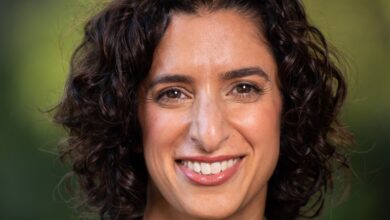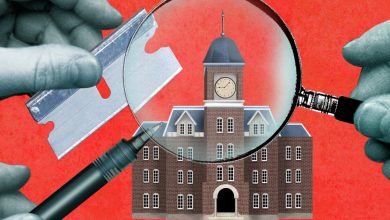Florida Faculty Worry About Bill That Would Ban Certain Majors

Faculty members in Florida are worried that their departments and academic freedom are at risk after lawmakers in the state proposed banning majors and minors in “Critical Race Theory, Gender Studies, or Intersectionality, or any derivative major or minor of these belief systems.”
House Bill 999, a 23-page piece of legislation before Florida’s state legislature, follows the lead of Gov. Ron DeSantis, a Republican, in targeting what’s taught in higher education and how academe operates. If passed, the bill would prohibit public colleges from funding any projects that “espouse diversity, equity, and inclusion or Critical Race Theory rhetoric.” It would also give boards of trustees unprecedented power over faculty hiring, tenure review, and rewriting university mission statements; ban general-education courses that teach “identity politics” or define American history “as contrary to the creation of a new nation based on universal principles stated in the Declaration of Independence”; and ban academic programs in gender studies, critical race theory, and intersectionality.
The bill, sponsored by state Rep. Robert Alexander Andrade, a Republican, is early in the legislative process and may be amended before being voted on. The legislative session starts on March 7.
“Conservative voters, Floridians, have been telling us for years that college campuses have been far too focused on political indoctrination and not enough focus has been given towards preparing these students for the real world,” Andrade said in an interview with WEAR ABC 3, a local television news station. He did not respond to The Chronicle’s request for comment.
The bill’s proposed ban on majors and minors has Florida faculty members worried about what could happen to their programs, jobs, and students if the bill passes. Most public universities in Florida offer majors or minors in gender studies, so those programs would likely be on the chopping block if the bill were to be enacted.
Critical race theory is an academic concept, rooted in legal scholarship, whose primary tenets are that race is a social construct and that systemic racism exists. Intersectionality is a theory that states people are complex, with different identities that overlap and intersect, often through complicated power dynamics.
Although there aren’t many majors or minors that go by those names, many academic disciplines discuss those topics in the classroom. Faculty members across disciplines are worried their programs could be targeted as well.
Irene Mulvey, president of the American Association of University Professors, said HB 999 is a violation of academic freedom, which she says requires faculty to have control over curriculums, regulated through peer review. “The profession has been self-regulating in this way for decades and has resulted in a system of higher education that’s the envy of the world.”
Mulvey said academic freedom is important to uphold democracy and that HB 999 presents a threat to both.
“It is state-mandated censorship,” Mulvey said. “Under HB 999, the state is dictating what can be taught and what can be learned and what must not be taught. This is positively incompatible with democracy. It’s a complete violation of academic freedom. People should recognize how dangerous this is.”
Mulvey said gender studies isn’t the only discipline that should be worried by HB 999, because other majors and minors may be targeted by the bill’s vague language.
Topics like race, gender, and intersectionality, she said, “come up in every subject, whether they’re being studied as academic disciplines, or through examples in statistics about crime rates or poverty rates.”
Pawns in a Political Game
Amy Reid is director of the gender studies program at New College of Florida, an institution that recently became the focus of attention after Governor DeSantis appointed a new slate of trustees there and vowed to remake the college as the “Hillsdale of the South.” Reid said she’s particularly concerned about the new bill’s targeting of her field.
“Gender studies as a field, and intersectionality as a primary tool of analysis for gender studies, helps people ask the questions that they want to ask about not only our present moment, but about our history, and the social forces that have created our past and our present,” Reid said. “There’s no indoctrination. There’s just the support for students who are trying to ask the questions and pursue the answers that they’re looking for.”
Reid, who is also a professor of French language and literature, said she’s worried about what will happen to students in the college’s gender-studies program if the bill passes. She’s heard from students who have decided to transfer out of New College, and out of Florida, to continue pursuing their studies. And she’s heard from prospective students who have asked for their deposits back. Reid is also worried New College could lose its accreditation.
“The hardest thing for me over the past two months is seeing the toll this is taking on our students,” Reid said. “We have a small student body who came to New College because they want to drive their own education. They’re motivated students with goals. And now they’re facing a situation where their education is being used as a pawn in somebody else’s political game. That’s devastating.”
Republicans in Florida and across the nation have targeted academic programs, like gender studies, for purportedly pushing a left-wing agenda onto students. Reid said such accusations are out of touch because they misgauge students’ independence from their professors.
“They challenge every idea we put forth,” she said. “They challenge everything that they read in books. They are far from passive, and they are certainly not swallowing anybody’s Kool-Aid.”
David Canton, director of the African American-studies program at the University of Florida, said that HB 999 is too extreme and that he’s optimistic it will be watered down during the legislative process. But if the bill is passed, Canton said he wouldn’t be surprised if his program is targeted as a major to ban, since it explores topics like critical race theory and intersectionality. But Canton insists those theories aren’t pushed on students and that African American studies is a much broader field that encompasses other, sometimes even contradictory, theories.
“Our program is like any other discipline,” said Canton, an associate professor of history. “There are different debates.” Not all scholars in his field agree with intersectionality or examine critical race theory, he said.
Canton said students in his African American-studies program are not taught what to think or believe. He says they are taught about the importance of voting, but not which party to vote for.
“The misperception is that in these majors, students are being told what to think and what to do, rather than being introduced to different perspectives,” Canton said. “If you go to any African American-studies class, they’re not indoctrinating students with this ‘woke’ ideology.”
The reality of race and gender studies dialogue in most college classrooms is quite different than the portrait being painted by Republican politicians and pundits. “You’re introducing students to ideas in different communities, perspectives, ideologies, which inform students that African Americans are not monolithic. They have many ideas,” Canton said. “Students are not told to go join a Black Lives Matters movement. No one’s told that.”
Jon Sensbach, chair of the history department at the University of Florida, said most of his colleagues on campus are nervous about the potential impact of HB 999.
“Everybody’s talking about it,” Sensbach said. “There’s a lot of question marks as to what the future might hold if this bill passes. I would say attitudes are ranging from resignation to defiance to bewilderment.”
Sensbach said he’s confident that if the bill were to be passed, it would not lead to a ban on history majors. But, Sensbach isn’t sure whether the bill would affect the courses and content he’s allowed to teach within the major.
“Does [HB 999] affect the teaching of racism?” Sensbach asked. “Does that affect the teaching of systemic gender inequality in American history or systemic racism in a number of American institutions? So to what extent would that affect our ability to discuss any of those concepts?”
Sensbach said the legislation would take state control of higher education to a new level in American history.
“We’re not used to the government prescribing what we can and cannot teach,” Sensbach said. “That would seem to be a sort of intervention by the government that we are not used to and that I am not convinced that the founding fathers would have endorsed.”
Source link






